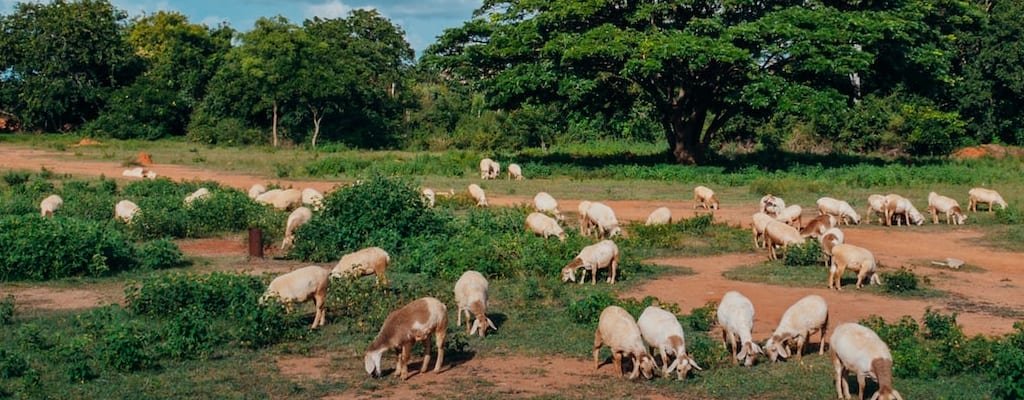beyond the black stump: Idiom Meaning and Origin
What does ‘beyond the black stump’ mean?
The idiom beyond the black stump is commonly used in Australian English and refers to a remote or isolated place. It implies being far from civilization or urban areas.

Idiom Explorer
The idiom "middle of nowhere" refers to a remote or isolated location, usually far away from populated areas and difficult to access. It implies a sense of being lost or disconnected from civilization.
The idiom "in the dark" means being unaware or uninformed about something, lacking knowledge or understanding. It is often used to describe a situation where someone is kept ignorant or intentionally left out of important information or events.
The idiom "huckleberry above a persimmon" means someone or something that is superior or beyond compare. It is used to indicate a level of excellence or uniqueness that is unmatched.
"High and dry" is an idiom that means to be left in a difficult or helpless situation, especially without any assistance or support.
The idiom "great beyond" refers to the unknown or beyond what is known or comprehensible. It implies something that is beyond the scope of our understanding or beyond the limits of our knowledge. It can also refer to the afterlife or the world beyond death.
An idiom used to describe someone leaving or departing. It implies a physical or metaphorical departure from a place or situation.
The idiom "get lost" means to tell someone to go away or leave, often used in a rude or dismissive manner. It is a way of expressing annoyance or frustration with someone's presence.
The idiom "edge of the world" refers to a metaphorical location beyond which everything is unknown or uncharted. It signifies the limit or boundary of one's knowledge or experience.
The idiom "edge of the earth" is used to describe a feeling of being in a remote, isolated, or faraway place, as if one is at the very limit or furthest point of existence or civilization.
The idiom "draw stumps" means to end or finish an activity or an event abruptly.
Untangling the Enigma
Beyond the black stump, an idiom commonly used in Australia, has its origins rooted in the early days of European settlement in the country. Early explorers and surveyors would use blackened tree stumps as markers to denote explored territory. Over time, this practice evolved and the idiom "beyond the black stump" came to symbolize a place that is remote, isolated, or far away from civilization.
In Australian literature and culture, the idiom has become deeply ingrained, capturing the vastness and remoteness of the country's landscapes. It is often employed to convey a sense of distance, desolation, and a lack of modern amenities. The phrase has transcended its literal meaning and has become synonymous with the unexplored, the unknown, and the untamed.
Despite its origins lying elsewhere, "beyond the black stump" has acquired cultural significance in Australia. It is recognized not only in the country but also in other English-speaking nations. The idiom represents a place that exists on the fringes, where traditional rules and conventions may not hold true. It evokes a sense of mystery, adventure, and potential danger.
An idiom related to "beyond the black stump" is "arse end of nowhere," widely used in colloquial Australian language. Similar to "beyond the black stump," it describes a location or situation that is far away, remote, and difficult to reach. This idiom shares the themes of isolation and distance, adding to the idea of the unexplored and the untamed.
Another related idiom is "the great beyond." This expression also conveys a sense of remoteness and the unknown. It implies a place that is beyond the bounds of what is familiar or understood. The connection between "the great beyond" and "beyond the black stump" lies in their shared association with the unexplored and the untamed.
The idiom "beyond the black stump" has become a symbol of the uncharted and the mysterious. It captures the imagination and invites exploration into the unknown, just as the blackened tree stumps once marked the boundaries of explored territory. Its usage extends beyond its literal meaning, resonating with a well-informed audience familiar with the vast landscapes and cultural significance of Australia. It continues to be embraced as a part of Australian language and cultural identity.
Example usage
1. She lived beyond the black stump, in a small cabin in the middle of the forest.
2. The old treasure map led them beyond the black stump, to a hidden treasure buried deep in the desert.
3. The small town was isolated, beyond the black stump, with no modern amenities or services.
More "Geography" idioms



